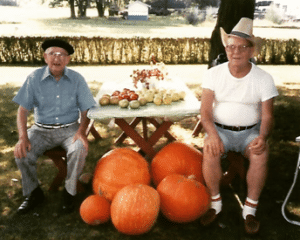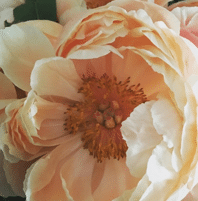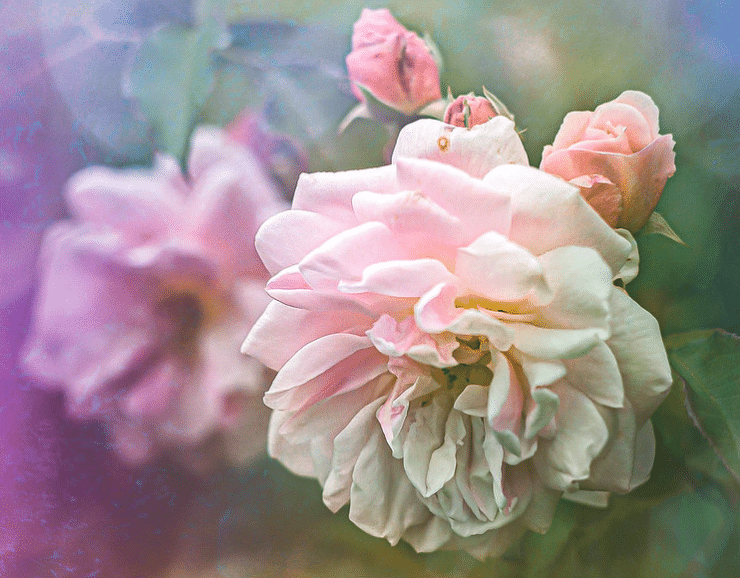Now that spring is edging into parts of the country, clearly arrived here in Texas, gardening becomes a welcome part of our lives. Even in a city apartment, there’s an urge for a new plant at the window or dressing a balcony in greenery. In the past two or three years, it has been so hot and dry where I live, that I chose to plant nothing except a few annuals in patio pots, but this year I braved a few tomato plants, radishes, and strawberries in a shadier spot (despite “full sun” mandates). I am grateful for the recent cool nights that encourage growth and blossoming.
I spent my young years living with my grandparents and near my great-grandparents who had sold their big farm and moved next door. Such wonderful moments of life gifted me by four special people who’d only known living off the land. Those early years grounded me before my mother remarried and we moved overseas. As a young girl, my sister and I spent many an hour sitting at a fruit stand along the highway in front of Grandma’s house. As the truckers would honk and wave at us, we peddled pints of strawberries, raspberries, and green beans, baskets of fresh sweet corn, squash, and onions. We’d shell peas with Grandma on her back porch.
Gardening is demanding work, but it is also ritual. The planting, the weeding, the watering—the tending to nature’s creation. On the other hand, the beauty of wildlands and native grasses needs no tending except the sun, soil, and showers. Irish poet Seamus Heaney’s great poem, Digging, eloquently brings to light the toil and the tradition of working the land, as versed in this excerpt from Heaney’s poem.
The coarse boot nestled on the lug, the shaft
Against the inside knee was levered firmly.
He rooted out tall tops, buried the bright edge deep
To scatter new potatoes that we picked,
Loving their cool hardness in our hands.
—from Seamus Heaney’s Digging
Heaney’s poem delves into the duty of work and the bond with his father and lineage. My grandmother’s parents both came from families that farmed the land along the Delaware River since the 1700s. It’s in the blood, though a “green thumb” was not passed along to me. But I saw my grandmother feed hobos on the back porch. I saw her root cellar and understood how they lived more comfortably than most through the Depression. Gardening connects us to the soil, but it also joins us to the world beyond and before us.
Grandpa’s Garden
Russell was Grandma’s second husband,
the only one I knew, but he held an aura
of stories and the spiral labyrinth of nature.
The seasons lived within him
like an almanac, and he knew when
to wed the pea and the soil in the spring rains
and how to coddle a chick beneath a warm bulb.
The clouds cordially chatted with him
of how the storms would weave the sunshine,
and Grandpa charmed the crows to abandon
nibbling his cherry trees in a magical kingdom
where the gardens loved him
as if paramours perennially returning
to the husbandry of Grandpa’s unruffled devotion.
—Sandra Fox Murphy

Grandpa, in beret (he loved his hats) late in life,
proud of his fall garden’s gifts.
Scottish poet Muriel Stuart was born in 1885 in London and wrote a book called Gardner’s Nightcap. Here is her evocative poem about the hope held in a seed.
The Seed-Shop
Here in a quiet and dusty room they lie,
Faded as crumbled stone or shifting sand,
Forlorn as ashes, shrivelled, scentless, dry —
Meadows and gardens running through my hand.
In this brown husk a dale of hawthorn dreams;
A cedar in this narrow cell is thrust
That will drink deeply of a century’s streams;
These lilies shall make summer on my dust.
Here in their safe and simple house of death,
Sealed in their shells, a million roses leap;
Here I can blow a garden with my breath,
And in my hand a forest lies asleep.
—Muriel Stuart
Stuart’s poem speaks to me, for there is magic in gardens. It’s the mystery—where life emerges from a husk, from a thing that appears to be nothing at all. Her words bring to mind the tumbleweeds that blow across the plains, the highways, caught in barbed fences or scratched my legs on a windy day when I lived in Amarillo. I once wrote a poem about them, a haibun:
Tumbled Thistle
When winter wails through the plains, the thistle weeds roll, spin, tangle into orbs.
Prairie winds carry them far till grasped in barbed wire and shrub, or unhindered, the
sundry spheres sail on and on and on to the west. They are truly cadavers, assembled
as if a reunion of ghosts, for the thistle has died. Yet, the trolling tumbleweeds
migrate beyond like a roving meadow, where only the diaspores remain, rootless and
free within bramble, propelling their progeny to seed the great earth.
Fetched wild in grim gusts,
tumbled orbs strew sanguine seeds
to sprout tall in fields.
—Sandra Fox Murphy
Gardening is more than sustenance—it includes flower beds, and poet and musician Patience Strong, born in 1907 in England, found a bond in nature. A popular quote of this author: “I thought I had finished with romantic adventures, but half-way through life and well past the age for losing one’s heart, I was suddenly swept off my feet by a new love, a passionate, tyrannical, all-absorbing emotion: the love of a garden.”
I am amused by the secrecy of bulbs, like hide-and-seek. How they live deep in darkness and know when to rise, to blossom, and then return to the void again until next year, so here is Patience Strong’s poem about bulbs:
Bulbs
I’ve put my bulbs in coloured bowls and hidden them away —
Inside my cupboard, where they cannot see the light of day —
I’ve put them in the soft black mould as cosy as can be —
And in the quiet darkness they will work their mystery…
And when all things lie lifeless locked in winter’s frozen sleep —
Inside my cupboard one sweet day a pale green tip will peep.
I’ll bring them out into the light and set them in my room —
And silently and secretly they’ll grow and bud and bloom —
The grey old house will waken from its drowsy slumbering,
To find the rooms ablaze with flowers, as if it were the Spring! …
With daffodils and hyacinths, narcissi, tulips too —
A flaring mass of loveliness in gold and pink and blue —
And I shall smile, remembering my small part in the show —
For though we plant and tend the bulbs —
it’s God that makes them grow.
—Patience Strong

Photo by author
Flower beds yield such rewards, and peonies are my favorite flower. When my husband was assigned overseas and I moved near family, my grandmother would bring me a large bouquet of peonies cut from her flower gardens every Saturday morning. The late anthropologist Loren Eiseley authored an essay titled How Flowers Changed the World, published in 1957 (posthumously published as a book), writing that “the appearance of the flowers contained also the equally mystifying emergence of man.” Flowers bring us joy, sometimes sneezes, and come lush and bold to announce the end of winter. The annuals, the perennials, the rekindled blooms of shrubs and trees, even cacti. The flower is the muse of so much poetry, such as the famous William Wordsworth poem “Daffodils,” also titled I Wandered Lonely as a Cloud. Here is the splendid closing stanza of Wordsworth’s poem.
For oft, when on my couch I lie
In vacant or in pensive mood,
They flash upon that inward eye
Which is the bliss of solitude;
And then my heart with pleasure fills,
And dances with the daffodils.
—from William Wordsworth’s I Wandered Lonely as a Cloud
On a lighter note and by one who loved to press wildflowers, here is my poem:
The Press of Flowers
I love bluebonnets
pressed between pages
pristine in a heavy book
surprising me—next year
when I search for words—
blooms of metaphors staring back.
And I love brown-eyed susans
flat in a wooden press
waiting waiting waiting
for the screw to turn || relieve
the pressure of time
where I find them all giggly.
—Sandra Fox Murphy
Your Turn
Write about your gardens or your favorite flower. Their fragrance and how open from a bud to bloom and fade to gone. The smell of the soil and spring rains. How you feel when you tend your garden and flower beds. In the words of @codeofthewest, “You don’t stumble into a good life. You tend to it.” Like a garden.
Photo by Judy Dean, Creative Commons license via Flickr. “The Seed-Shop” by Muriel Stuart and “Bulbs” by Patience Strong are in the Public Domain. Post by Sandra Fox Murphy.
- Poet Laura: The Verdant Respite of Portugal + New Poet Laura Introduction - October 1, 2025
- Poet Laura: In the Glow of the Desert - September 3, 2025
- Poet Laura:In the Sway of Tides - August 6, 2025


L.L. Barkat says
Oh! Did all we grandchildren run little farm stands? (This made me smile to hear of you doing it… as did my sister and I for our grandmother.)
I love gardens, too. And, I, too, seem not to have gotten the green thumb. (Do you think if we’d grown up farming we would have gotten it?)
Sandra Fox Murphy says
All us kids learning entrepreneurship! Great memories, and though I didn’t get that green thumb, we all learned the value of hard work and good food. Yes, it would probably a large group of us (now boomers and millennials) who manned those roadway fruit stands!
In spite of my lack of a green thumb, I persevere with growing things. There’s still the ritual and hope that comes with planting a seed.
Bethany R. says
What a beautiful array of lines, poems, and thoughts! Particularly enjoyed your pressed flowers poem and the grandfather that knew,
“how to coddle a chick beneath a warm bulb.
The clouds cordially chatted with him
of how the storms would weave the sunshine”
Thanks so much for sharing this with us.
Sandra Fox Murphy says
Thank you, Bethany! Great memories for me. My grandpa was quite the character–so many stories (but Grandma was the boss!).
lynn__ says
What a lovely, timely post for spring! One thing I miss after retiring from the farm is puttering around in my garden, although my back is relieved not to hoe 🙂 Perhaps I can convince my hubby to make a raised bed…
Sandra Fox Murphy says
Yes! A raised bed or tall patio pots. The heat in recent years has discouraged me, but I put some annuals in pots on my patio. Lantana can handle the summers here. I’m so glad my words inspired you.
Michelle Ortega says
Sandy, as I told you “in person,” I so enjoyed the imagery of Grandpa’s Garden, especially the “spiral labyrinth of nature” and the lines Bethany pointed out above!
Sandra Fox Murphy says
Thank you, Michelle! In retrospect, I have a poem, Fibonacci, that was likely the subconscious source of that labyrinth phrase!!! My grandpa was also a wonderful storyteller, some true and some not! I wish, as a girl, I’d been wise enough to ask many more questions. I’m so gifted to have known my grandparents and great-grandparents.
Katie Spivey Brewster says
Sandra,
Thank you for this lovely collection of springtime poems:)
You have brightened my day and given me new inspiration to put some begonias and petunias in pots that I got weeks ago.
Also, you’ve prompted a bit of nostalgia for my parent’s vegetable garden, and memories of my paternal grandmother’s lush plants on her front porch.
After hubby retired last fall, we moved to NC to be near our grands. I’m actually now living in the county where my maternal grandfather farmed and my mother and her siblings grew up.
So enjoyed “Grandpa’s Garden” and “The Press of Flowers.”
Gratefully,
Katie
Sandra Fox Murphy says
Oh, Katie, I’m so glad I brightened your day! I deeply relate to your nostalgia; what I wouldn’t give to spend another day in the gardens and kitchen with my grandparents. North Carolina is a beautiful state–near my sister in Hampton, VA and I wanted to go get my MA at Queens University at Charlotte. But now I’ve become ingrained in the storytelling in Texas, so I don’t know if I could leave. Thank you for sharing, and I hope your begonias bloom big.